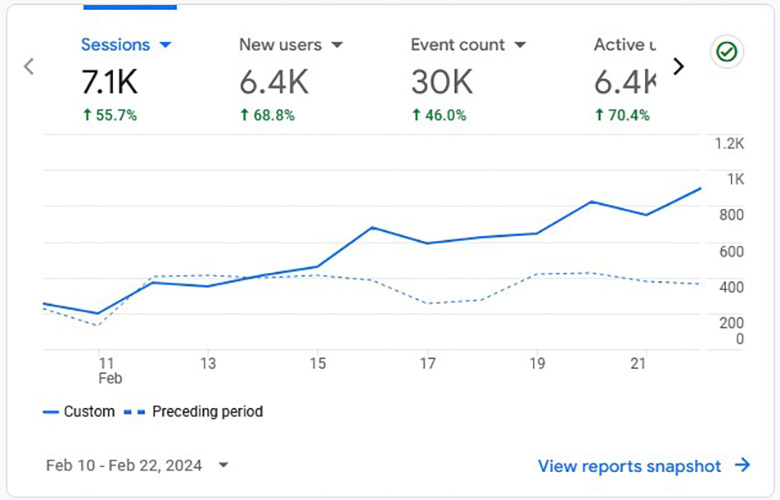Chapter 1 - The Fundamentals of Law Firm SEO Campaigns
Key Components of a Law Firm SEO Roadmap
A well-defined SEO roadmap is essential for law firms looking to attract new clients through organic search. While there a over 200+ factors that Google takes into consideration, the overall summary of what needs to be reviewed are:
Keyword Research
The goal of this initial step is setting the trajectory for the campaign. It is the process of identifying the legal terms and phrases potential clients use to search for your practice areas. From there, it is uncovering the keywords with a good search volume but manageable competition. The ultimate goal is to rank for these keywords and define your firm as the industry leader within your designated marketing area.
Content Marketing
Once keywords are established, you need the proper content to be relevant for the keywords you are targeting, essentially developing content that is a 1:1 match up to your keywords. In reviewing your competition, the objective is to outline and create high-quality, informative content such as core practice area content (law hubs), blog posts, articles, case studies, and informational papers. Once this is completed and properly organized, on-page optimization of the content is needed for your chosen keywords yet we want to prioritize user experience and readability.
Link Building and Local SEO for Law Firms
Link building is the process of listing your website, information, or domain on another website and getting a link back to your website from that other website. Obtaining links builds authoritative power to a website. It is a goal of quantity within quality; the more you get that is of quality, the better. From a local perspective, there are subsets of additional items to complete such as claiming and optimizing your Google Business Profile listing with accurate information and positive reviews and building local citations by getting your law firm listed in relevant online directories.
Technical SEO Optimization
While there can be a cumbersome amount of technical updates, the overall gist of this review is with the purpose of ensuring your website is mobile-friendly and has a fast loading speed. As it pertains to the content, implementing a clean and well-structured website architecture for easy navigation.
Reporting, Analytics, and Return on Investment
The main goal for all SEO campaigns is not just to rank, obtain traffic, but most importantly, convert. Obtain potential new clients and receive a return on your investment. To monitor every campaign, there are applications like Google Analytics to track website traffic, keyword rankings, and conversions as well as specific digital marketing applications that monitor the performance of your SEO efforts so as to make adjustments to your strategy as needed.
By implementing these key SEO components, the above SEO roadmap will help law firms attract more qualified leads and grow their business.
Chapter 2 - Keyword Research
Keyword research is the foundation of any successful SEO strategy and campaign. The process involves identifying specific keywords phrases that potential clients use when searching for legal assistance and services. And they are not always what you think, which is why this step is so critical.
The research phase helps you understand the needs of your target audience and identify valuable keyword opportunities related to your legal niche and location. The goal is to choose keywords that have sufficient search volume, align with the services for marketing, and have a reasonable level of competition.
Start with the basics and brainstorm your practice areas and the services that you offer. Then multiply those practice areas by your geographic locations where you want to target and rank. Then add in the base terms of lawyer(s), attorney(s) and law firm to make the keyword relevant to the legal industry.
You can then use a merge word function to see all the possible combinations (45 different keywords in this instance).
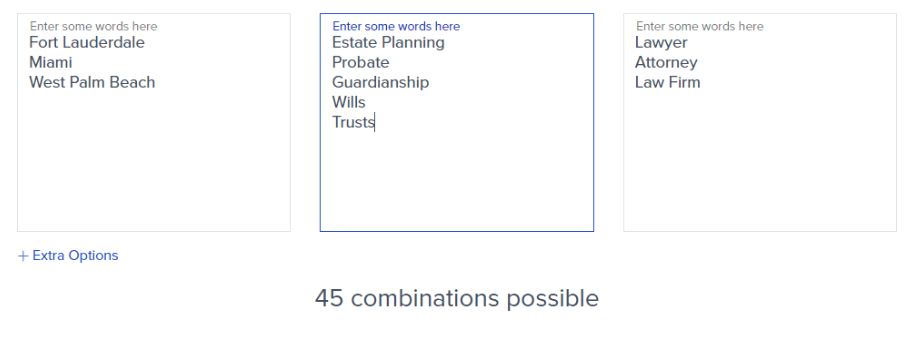
You can then go to a keyword research tool, like Google Keyword Planner, enter the keywords and see the search volume results. Most people search for probate and then estate planning. With the largest search volume coming from Miami, Fort Lauderdale, and then West Palm Beach.
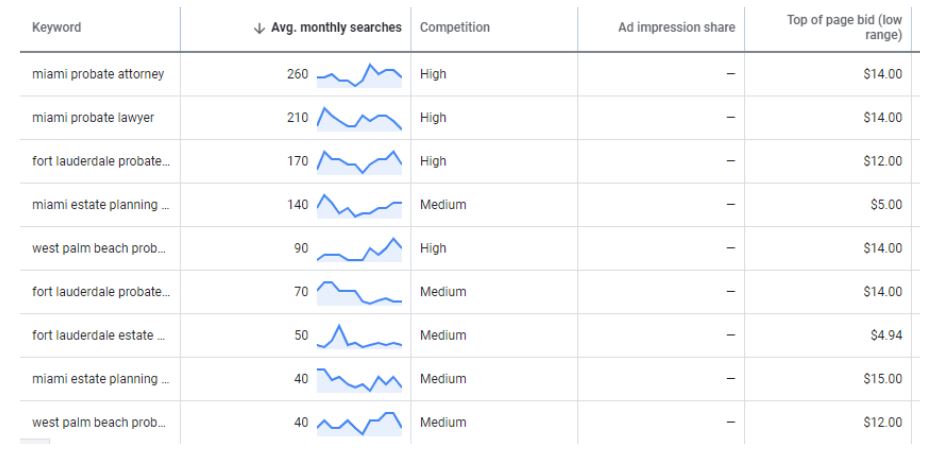
The next step after evaluating all of the keywords is to hone in our focus and prioritize what is most important. We want to define primary, secondary and tertiary keyword groups based upon business objectives.
The primary keywords will be the main focus of the campaign. The focus will be on improving relevance and authority for these particular keywords. The secondary and tertiary can be thought of as long term business objectives or for keywords that aren’t as important from a business perspective as the primary.
Now this is the most simplistic research you should do. It does not take long but gets you on the right path. You can do more advanced searches for additional terms and long-tail keywords, as well, in order to cast a wider net with your keyword research techniques.
From there, we evaluate the website from a content perspective and make recommendations to bolster the overall relevance on the website for our targeted keywords.
Chapter 3 - Content Marketing & On-page Optimization
Home Page Writing
The home page is often the first impression potential clients have of your law firm. It should provide a clear and concise overview of your services, expertise, and location. Effective home page writing includes incorporating relevant keywords naturally and engagingly, making it both user-friendly and SEO-friendly. We work content first, so we will iron out what we want to say and ensure the page is optimized, before we make it look beautiful.
Core Content Writing
Core content refers to the primary pages on your website, mainly practice area pages. You need to have a page of content with substantial text for every keyword you want to rank for in Google. PaperStreet has a team of all attorney writers who craft informative, well-structured, and keyword-optimized pages that showcase your legal services.
Blogging
Blogging is non-negotiable. It is 100% necessary to regularly publish informative and relevant articles that address common legal questions and concerns in your practice areas. Blogging helps you establish authority in your legal niche, attract organic traffic, and engage with potential clients. Our monthly packages include a certain number of blog posts each month.
What to Write and How to Structure Content
Site architecture refers to the structure and organization of the pages on your website. It includes creating a user-friendly navigation/menu that allows visitors and search engines to easily access and understand your content. Proper site architecture ensures that your website’s pages are logically grouped, making it easier for search engines to crawl and index your content.
Search engines rank websites higher that offer relevant information. You need to make sure your main practice areas are over 2,000 words per topic. Become THE dominant resource online. Are you a probate lawyer? Then write about probate and all its intricacies. Are you a personal injury lawyer? Then don’t just write about injuries, but very specific injury types – like truck accidents or specific medical conditions.
We set up a sheet of all the pages on a website. Then match pages to specific keyword phrases that you want to rank high. Each page should have a primary keyword phrase and, if applicable, a secondary keyword phrase (or related terms) value assigned to them. Make sure that every page has a focus though.

For length, you will want to write enough to be the dominant resource. If there is no one in your industry, then you can potentially create shorter pages yet studies have shown that the average Google first page result contains almost 1500 words. If there is a lot of competition, then you may need to produce an ultimate guide of 2,500 to 5,000+ words.
The key is to answer the questions users are searching for, or matching up to user intent. As a helpful tip, always check out related searches or the featured snippets, and featured questions of Google search and write for those specific terms. What better way to become relevant than having the answers to the questions people are searching for. For example:
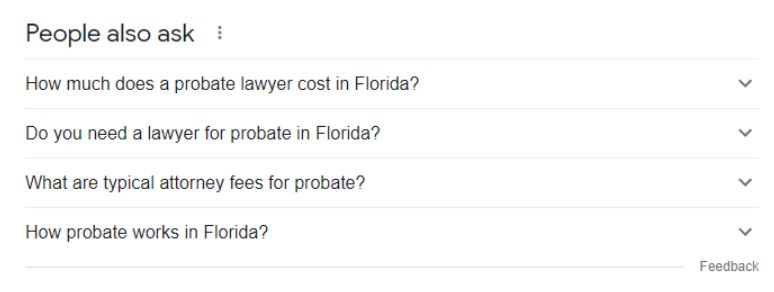
Chapter 4 - Link Building For Lawyers
Link building is the process of acquiring high-quality backlinks from authoritative and relevant websites. These backlinks signal to search engines that your website is trustworthy and valuable. Effective link building can boost your website’s authority and search engine rankings.
Google ranks sites based on their content but also based on the authority they have on the web. Authority is determined by backlinks – someone linking to your site. Obtaining links will ensure you are well-positioned to rank high.
Law firms can do this in several ways: 1) legal directories, 2) business directories, 3) local listings, 4) writing content and publishing offsite, 5) getting PR / media mentions, 6) getting social media mentions, 7) sponsoring local events, 8) sponsoring national events, 9) outreach to bloggers, and 10) building such a great website that people want to link to it as a resource.
What Types of Backlinks To Get
When link building, it is very important to only secure high quality backlinks, don’t simply get every possible link available to you. Review each opportunity to check for spam and also evaluate if it is topically or locally relevant to your website. Too many spammy, low quality websites linking back to you can result in a Google penalty or a decrease in rankings. In order to evaluate a quality of a website we review multiple factors like domain authority, relevancy of the website, organic traffic, type of link (nofollow vs follow) and more.
Directories
A directory is a website that allows you to add a profile for your law firm or business and normally includes basic contact information, a description, logo/imagery, and a link to your website. Setting up your firm on the top business and legal directories is important to your overall online presence and authority. These can include well known sites that apply to most businesses like BBB.org or smaller more niche sites like your local Chamber of Commerce. Creating, claiming and verifying your listings on all major directories will allow you to obtain hundreds of new backlinks to your website.
We have put together a list of recommended directory sites as a good starting point for every law firm to create: Best Legal Directory Listings. We suggest you review that list and get all that apply to you. Then start a content marketing plan and outreach plan to write informative content about your practice areas to obtain links through outreach and networking.
In addition to setting up profiles on the main business directories, you should research new opportunities that uniquely apply to your firm. This can be associations local to your area, publications that post content about your niche topics, or websites that target the same community of people interested in your services. Be aware that some of these directories may charge fees to be listed or to add advanced features like your logo or website URL.
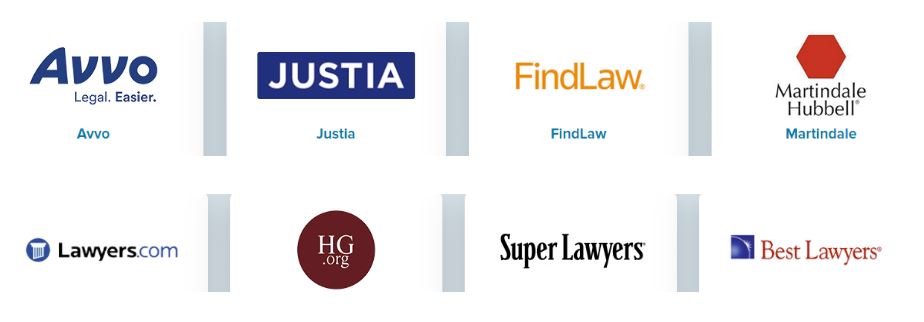
Guest Blogging & Article Submission
Part of proving your authority to Google is to publish content on the web outside of your own website. There are several types of publications you could submit to, but no matter which you choose, it is vital to ensure all content is high quality, relevant to your targeted keywords, and links back to your website if possible. Some examples are:
- Legal and topically relevant publications like HG.org and blogs within your niche.
- Locally relevant websites that accept outside submissions such as a regional magazine. They normally require very specific guidelines and must be approved by an editorial team before posting
- General websites that allow you to set up your own platform to easily post new content without any type of approval process. This includes medium.com and patch.com.
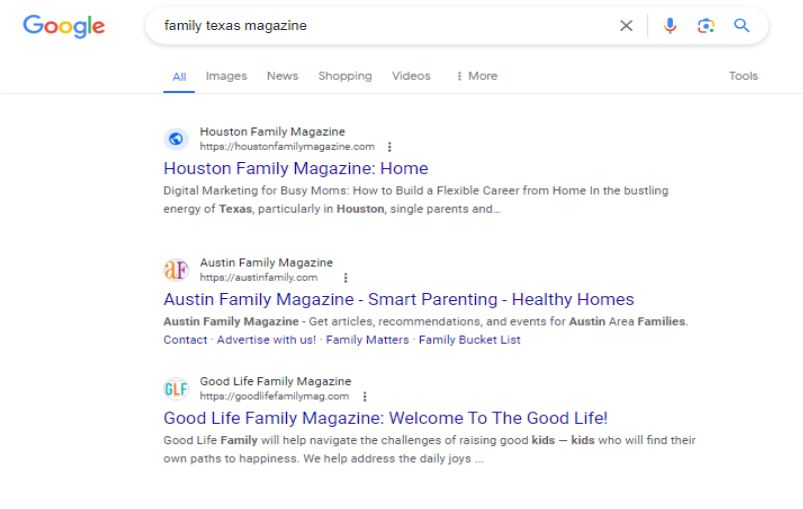
Outreach & Pitching
Creating amazing content on your website is only half of the battle. In order to attract links you should also pitch your content to those who are most likely to link back to it. Pitching is normally best for content pieces that are more informational or shareable. It doesn’t work as well for service or product pages. Outreach and pitching can happen a few ways:
- Manual Research & Outreach (Link Prospecting): Utilize Google and different search operators to find sites that target the same topics as your content piece. Once found, reach out to pitch your resource.
- HERO (and other similar third party services): This is a free service called Help Every Reporter Out. It allows journalists to submit queries via email looking for quotes from experts in varying fields. Once you sign up you can check the questions daily and submit answers for the chance to be featured in an article with your website link. Read more on their website.
Link Building Practices to Avoid
In addition to reviewing each link opportunity for overall quality, there are a few specific tactics you want to avoid when link building. This includes:
- Link Farms & Private Link Networks. These are groups of websites all owned by the same person and set up to swap and/or sell links to other people. They may send out a bulk email that includes a long list of websites they can add your site to for a “small” fee.
- Comment Spam. Years ago people would comment on dozens of blogs and articles on the web and add their website within the comments to accumulate links. These days all of these links are nofollow and this strategy is considered outdated and spammy.
- Low Quality Directories and Article Sites. Choose quality over quantity. If the site seems spammy and doesn’t pass the quality/relevancy test, do not get a link on the site.
- Reciprocal linking. This is when you exchange links with another person for the sole purpose to manipulate rankings. They link to your website and you link to theirs. Sometimes directories may participate in this tactic by only adding your listing if you link back to them first.
What Our Clients Say
Chapter 5 -Technical SEO
Technical SEO is an extremely important part of any website and marketing campaign. Without a proper foundation this can lead to a poor user experience and make it more difficult for search engines to crawl and index your content. Your law firm’s website needs to load fast, be mobile-friendly, easy to navigate, and overall, function flawlessly.
It is best to utilize a website URL structure closer to the root domain but still includes organization. Also, URLs that are descriptive of the content and reflect the page title. Luckily, most modern CMS systems do provide this automatically. To keep search engines informed of your content, your website should have a dynamic XML sitemap file that reflects all of the active pages on your website.
It is crucial to have proper HTML meta tags, efficient web code, structured data and working internal & external links. Just because your website is built in WordPress® on a new template, does not mean that it’s optimized code. In fact, if you are using a theme or template, WordPress® is known for bloating code and being slower. But there are workarounds, by pruning plugins and optimizing the code to make it more streamlined.
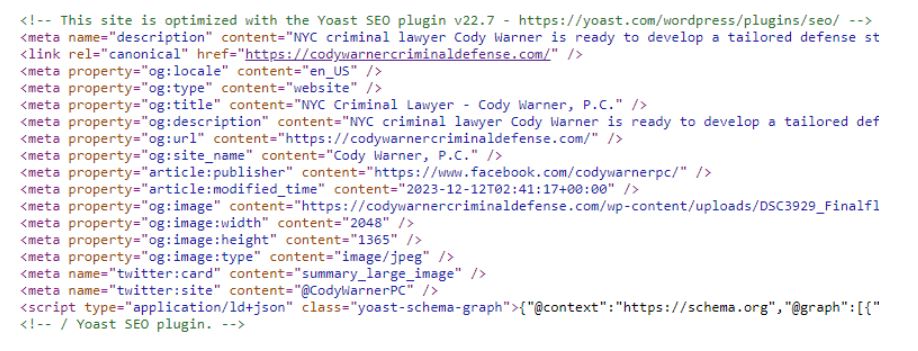
Here is a technical SEO checklist that covers the fundamentals of what needs to be addressed:
- Website is mobile-friendly and adapts to all devices
- Website load speed is satisfactory; passes Core Web Vitals
- Active SSL certificate installed; URLs redirect to HTTPS
- No internal & external broken links
- No internal redirects or redirect chains
- 404 error page exists with proper status code
- Broken URLs redirect to 404 error page
- No duplicate titles and meta descriptions
- All important images have alt tags
- No orphan pages; all important pages are accessible
- Webpage & organization schema markup exists
- Address clearly listed on each page with structured data
- Copyright and Blog date stamps are applied
- Robots.txt file configured and XML sitemaps are listed
- Extensive HTML sitemap page exists
- Google Analytics & Search Console is setup
Ensuring a Great User Experience
Google uses visitor activity to see if your site is a valuable resource. Does a potential client stay on your site long? Do they go back to search results and visit your competitors’ site and stay longer? Did the searcher contact you? Did they visit multiple pages?
All of this information matters. Your law firm needs to have a website that is easy to navigate and answers the users’ questions in full. We recommend you sign up for Google Analytics. The key metrics that we always look for are:
- Sessions – To see total traffic metrics.
- Views per Session – To see the average amount of pages viewed in a session.
- New users – To see if we are bringing in new potential clients to the website.
- Average session duration – To make sure that sessions are not 30 seconds or less
- Engagement Rate – This ideally will be greater than 50% but depends on the type of website you have. If you have a low engagement rate, you may have relevancy or technical issues with the page.
- Conversion rate – The number of visitors who convert divided by the total number of visits.
- Conversions – The amount of visitors who completed an action to contact the firm.
Take a look at your reports and identify pages that have high traffic, but low engagement rates and improve them. Also, further evaluate pages that are leading to lower conversion rates, views per session and average session duration.

Website Speed Standards & Core Web Vitals
To help ensure a great user experience and meet the demands of visitors, it is a must to have a fast loading website. We recommend a website load after 1-2 seconds no matter what device or connection a visitor is using.
The most significant reason to have a fast loading website is that it helps to avoid frustration for your users which can cause them to abandon their visit prematurely without converting. Also, the faster a website responds, it benefits search engines spiders who crawl and discover any fresh website content on a budget.
A fast website also has a direct correlation with passing Google’s web performance and user experience standards called Core Web Vitals which are technically a Google ranking factor. It is important to pass these specific benchmarks:
- Largest Contentful Paint (LCP): Measures loading performance. To provide a good user experience, strive to have LCP occur within the first 2.5 seconds of the page starting to load.
- Interaction To Next Paint (INP): Measures responsiveness. To provide a good user experience, strive to have an INP of less than 200 milliseconds.
- Cumulative Layout Shift (CLS): Measures visual stability. To provide a good user experience, strive to have a CLS score of less than 0.1.
A quick way to get started is to run your site through Google’s PageSpeed Speed Insights to see if it’s fast and passes Core Web Vitals. If it is not, follow the advice that Google provides below the score results. However, improving website speed can be complicated. A website developer will most likely be needed to make drastic improvements.

Mobile Friendly Websites That Adapt to Any Device
Like a fast loading website, it is also a must have to be entirely mobile friendly. The layout should automatically adjust to any type of device a user might be on whether mobile, desktop or tablet. This helps ensure a great experience for your user as the website is optimized for the device they are visiting on.
We want to avoid the scenario of viewing a desktop-only site on a mobile device or tablet where all of the text is extremely small and makes the website difficult to navigate. This would most likely cause the visitor to abandon the website shortly after.

Another important reason is that Google indexes websites from a mobile perspective first and prioritizes them especially for mobile searches. If your website is not mobile-friendly it can significantly reduce your visibility online from a keyword ranking perspective.
Lastly, most traffic now comes from a mobile device. People need information on the go. If your website isn’t optimized for the mobile experience, you are going to be at a heavy disadvantage. Mobile friendly sites are no longer optional but now a necessity.
XML Sitemap is Present
An XML sitemap is a crucial website file that informs search engines of all important pages that exist. This list provides a roadmap of the URLs that you would like search engines to crawl and hopefully index – since that is never a guarantee.
Within the file, you can tell search engines when a webpage’s content was last modified. That sends signals to revisit the page and pick up on any important content changes.
To accomplish this all, it is best to use a CMS such as WordPress® in conjunction with an SEO plugin like Yoast or All in One SEO. Either plugin will dynamically update your XML sitemap as pages are added, deleted or updated on your website.

Afterwards, we recommend you upload the XML sitemap to Google Search Console and Bing Webmaster Tools to help keep the main search engines informed about any new content, updates or page removals on your website.
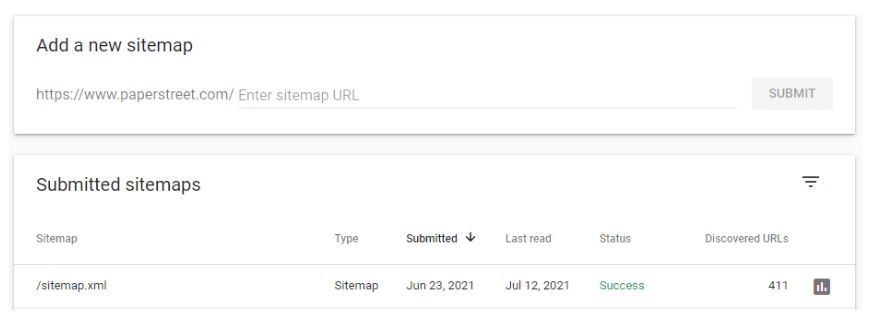
Take Advantage of Structured Data
Adding structured data to your website code allows search engines to better understand the elements and information that is present. Structured data adds more context and signals about the content instead of relying on search engines to figure it out.
For example, a website can have an FAQ page. With structured data, you can direct search engines to consider this page to be FAQ content that contains a list of questions and answers pertaining to a particular subject. Then you define which is the question and the answer.
Also, you can use structured data to inform search engines the type of webpage they are viewing. For example, a normal page, about page, contact page, blog, article, etc. This is helpful for Google to know and can show this appropriately in search results for respective searches.
One of the biggest benefits is that certain structured data can help with an enhanced listing in Google’s results page. Some popular data types to take advantage of with structured data are reviews, recipes, job posting, FAQ, videos, events, etc.

Keeping Track of Website Analytics & Rankings
The key to long term marketing success is using analytics. We recommend continual monitoring of keyword rankings along with website visits and interactions. These metrics together provide valuable insight into the state of your website and marketing campaigns. Otherwise, it is unknown what is proving to be successful or not.
It is important to have a tool that monitors your keyword rankings daily. Then you can be aware of any fluctuations to keywords you are ranking well for. Keywords drive traffic and provide your search visibility. It is crucial to know your positioning. And for new objectives, you can track the progression of keywords, services or locations that you are now targeting.
Also, you need to know what is happening on the website itself. Analytics data is helpful in showing how popular pages are performing and what important pages might not be receiving enough attention. Then you can further review your page and competitors to come up with an action plan to improve.
It is important that you track the conversions that happen on your website. Analytics software allows you to track contact form submissions and most vendors integrate as well. As a result, any live chat or phone calls that convert on the website are reflected in your data.

Chapter 6 - Local SEO
Local SEO involves targeting clients within a specified city, state or region. This type of SEO is focused on getting ranked on the map, and focusing efforts here can easily bring in more traffic. Currently there are three potential slots for the “map pack.” The rankings are dependent on the amount, quality and consistency of your citations which include your business name, address, and phone (NAP). Local rankings are also based on your distance to the city center, reviews on Google, website content, and of course overall backlinks. You need to claim your listing on Google maps, properly optimize it, and collect client reviews.
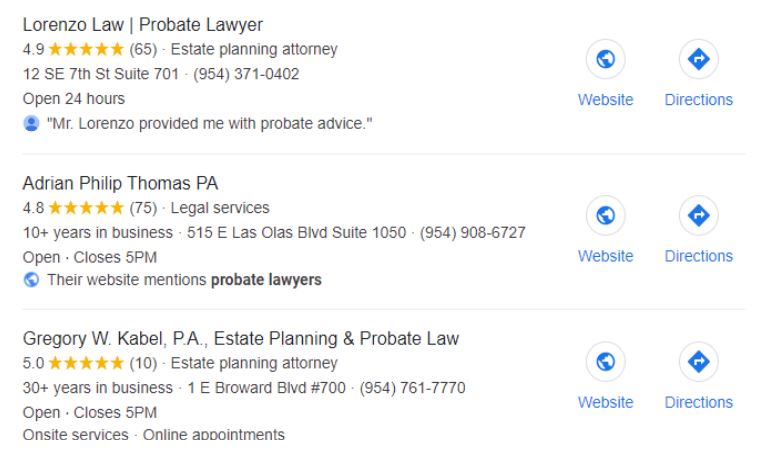
If you have a good number of reviews, located in the city you are targeting, and are writing quality content about your practice areas, you have a chance to rank high. The final item in this aspect of lawyer SEO is that you need to get citations and links to your site featuring the name, address, and phone (NAP). Pay attention to duplicate listings and also your specific address, as misspellings or oddities in the address matter.
Want to know more about local listings? Check out our blog post about local listings and its checklist for law firms.
Chapter 7 - Social Media
Utilizing social media networks helps your firm increase awareness for your brand and allows users to connect with you. Ensure your law firm has a presence on various social media networks including Facebook, Twitter/X, and LinkedIn. Depending on your firm’s goals and bandwidth you may also want to set up additional pages on TikTok, Instagram and YouTube.
Once these pages are established you should post consistently by sharing blog posts, firm news, videos, and other valuable information relevant to your practice area. Keeping your social pages updated helps boost your online reputation and increase your website visitors. Engagement on these pages is also important which includes encouraging comments, replying back, and overall actively interacting with different people and businesses on these networks.
Since social media management can be time consuming, we recommend planning your posts in advance and utilizing a third party tool like HootSuite or Sendible. If your firm doesn’t have the staff or time needed to keep your pages up to date, consider signing up for a social media management package to offload these monthly tasks to a dedicated marketing team.
Chapter 8 - Reporting and Consultation
SEO marketing is a partnership. Consultation and communication is key, often even critical. The success of SEO campaigns can have a direct correlation with how often you and your marketing teams are communicating. The information earned from this feedback can be vital, otherwise SEO teams are solely working off of numbers and analytical data.
There are several good applications that allow for SEO reporting which provide a “one-stop” overview of how a campaign is progressing. Good applications should show: the keywords for the campaign; their rankings; the attribution of traffic; the link building data (from referred domains to Google Business Profile Listing and their Reviews); to, arguably what is the most important factor, the conversions and the overall conversion rate of the campaign.

When data is properly tracked it should show enough for a marketing team to make valuable updates, only the firms themselves can state what traffic is turning into actual potential new clients versus simply a lead. When regular communication takes place, teams can enact on this feedback. Greater focus can be put into one effort over another. This focuses the effort of alignment. It makes sure that the shared goals that both you and your team have, ensure results and expectations are being met. Directly, this communication and consultation improves meeting business goals. Then by continuing to meet regularly, everyone is aligned to make informed decisions, collaborate together, and even work on a faster course of correction, should that ever be needed. Fundamentally, this not only demonstrates the transparency of how a campaign is progressing but simultaneously prompts proactive actions, which ultimately produces a better return on investment.
Chapter 9 - Frequently Asked Questions
Why Law Firm SEO is Important
You may not need SEO. What? Huh? An SEO company telling you that you may not need an SEO campaign for your law firm? Yes, it’s true. There is no one secret to SEO for lawyers. You can learn how to create a high-performing SEO campaign by reading this article.
If your law firm’s website is properly built in the last few years, you publish regularly, have existing backlinks, and your content is not a mess, then you may not need much, if any, SEO. Perhaps only a few tweaks to optimize your results.
If you are in the other camp though, where your business is new, you don’t know what you are doing, you have no content, no one links to your domain, and your site’s organization is a mess, then you may need to either train yourself in law firm SEO practices.
DIY SEO Option
If your law firm’s website is properly built in the last few years, you publish regularly, have existing backlinks, and your content is not a mess, then you may not need much, if any, SEO. Perhaps only a few tweaks to optimize your results.
You can absolutely conduct a SEO campaign yourself. It takes time though. You will need to write. You will need to get the top directory backlinks. You will need to post regularly and set up an outreach program to gain more backlinks over time.
The SEO Agency Option for Attorneys
For many lawyers, your law firm’s website is the key factor to your financial success. Sure, your legal expertise is how you win your cases, but a website is how you gain clients and grow. How can you market your firm?
Creating an appealing web design is only half the battle. If your site isn’t on the first page of Google, you are potentially missing out on hundreds of leads per month because potential clients aren’t considering you.
Reasons for an SEO agency include:
- Poor Rankings – Your search results show on page two or below. In short, you are not getting any traffic and you need to rank higher for more organic search visibility.
- New to the Game – You’re just learning about best practices and want to start off with good content and good links.
- Trying to grow beyond word-of-mouth references – Happy clients help grow your practice but they won’t reach the audience that SEO can.
- Penalized – You had great results, but suddenly fell out of favor with Google. You probably need help with a disavow file, backlink cleanup, or a copy edit to stop over-optimization.
- Going Broke – You are wasting money monthly on a team and want to know how you can improve.
- Too Busy – You want to be practicing law, not worrying about writing about the latest news in Corporate Law or reaching out to journalists to pick up backlinks.
Maybe you need to get a few more backlinks. Perhaps you need to sign-up for a few more directories or confirm your information. Maybe you need to publish a long piece of content like an Arizona car accident guide to rank #1 for a new practice. Or maybe you need help in organizing your site or simply making sure it runs fast or is mobile friendly?
We have been doing attorney SEO for over 23 years now. We have been asked and answered a lot of questions. Here are some of the highlights:
To be the quintessential industry leader in your designated marketing area by ranking for key phrases, which drives traffic to the website, and produces potential new clients.
The best-looking website won’t bring in any clients if no one views it. SEO puts your website at the top of the search engine results page so when a potential client is looking for a lawyer, your website is what appears.
A good SEO campaign also does more than that. Examining criteria such as bounce rate, conversions and traffic helps you to see what specifically on your website is helping to secure potential clients and what needs some assistance.
Yes, SEO can be highly effective for law firms. By optimizing your website and online presence (think directories, Google listings and social media channels), you can improve its visibility in search engine results pages (ahem, Google) to attract more organic traffic, and ultimately acquire more clients. If law firm SEO was a gimmick we wouldn’t have a job, nor would we be a successful business after two decades.
No, not all law firms need their website to convert new clients. Some law firms get their clients from referral sources and just need a web presence to verify their reputation. If you’re a plaintiff’s attorney, you need law firm SEO. While we have campaigns for clients in all areas of law, personal injury, criminal defense, family law, and estate planning are some of the most common types of lawyers looking for SEO assistance.
Further, if your site already ranks high for relevant keywords, then you won’t need SEO. But for most firms, you will need some help with either content, links, or the site setup itself. You need SEO to rank high in search results, which allows you to receive traffic and conversions to help grow the firm.
The simple answer: getting a return on your investment. Once we obtain top rankings, translating these rankings first to traffic on your website; then, most importantly, to conversions from the website. Conversions for attorney SEO campaigns are typically a phone call, live chat or contact form submission.
The attorney SEO process can take anywhere from 90 days to over a year. The time it takes depends on your existing website, its content, its authority and the same for your competitors. Niche keyword phrases can be ranked higher typically quicker than the most highly sought after competitive phrases.
Our law firm SEO campaigns start at several thousands of dollars and vary depending on several factors, including the size of the firm, its geographical location, the level of competition in its legal niche. For example, Miami personal injury is a much more competitive market than Des Moines estate planning. A more competitive market means more content and referring links and, therefore, requires a higher budget.
Local SEO is the process of gaining citations, reviews, links, content, and name/address/phone for your Google Business listing. The goal is to rank on the map pack for Google and promote your law firm.
Google showcases search results in several areas now: organic search results, paid search results, local search ads, and the various featured snippets. If you want to get clients from search, you basically have two ways – 1) build a better website with content and links, or 2) advertise with Google. Both can work. But we have found that SEO can be more cost-effective long-term if you rank high. This guide will tell you how to make SEO work for your firm.
You can improve your law firm SEO by adding new content to your website on a regular basis. Once SEO best practices are established, content makes the biggest difference. You should be posting several times a month (perhaps several times a week), and also include core content on your website about the terms/phrases you want to rank for in Google.
SEO keyword phrases are basically your practice areas X geographic areas X the base terms lawyer, attorney, and law firm. So you end up with a phrase like Fort Lauderdale Probate Lawyer or Miami Trademark Attorney. Create all possible keyword phrases by taking all your practice areas, geographical areas, and lawyer/attorney/law firm and merging them together.
At PaperStreet, we rely on in-depth keyword research to determine which keywords will be the most relevant, most competitive and most lucrative for your law firm. Some of our steps for this process include:
- Establish your geographical area. Determining the region you want to focus on — whether it’s a specific city, county or sometimes even nationwide — is the first step to creating an effective list of keywords.
- Identify keywords based on content. Content-based around keyword phrases is viewed as more relevant by search engines and will help improve your rankings.
- Add keyword suffix terms. Don’t just focus on one term! In the legal industry, there are so many options available to you. Use the terms “lawyer,” “lawyers,” “attorney,” “attorneys,” and “law firm” for the best results.
- Use suggestion tools. Tools like Google Keyword Planner and other sites like Ubersuggest.io or Keywordtool.io are great resources for generating ideas you might have missed.
Yes and yes. We continually monitor any changes, however minor they may seem. Any changes within any algorithm can potentially affect change and we want to make sure that we stay on top of any updates that can affect our campaigns.
Yes, so long as you follow the best practices guidelines, an SEO strategy can help your site. You can also seriously mess up your website and hurt your rankings if you try to scheme/scam Google.
Want to know how to quickly use and understand Google Analytics? Learn more about Google Analytics.
Yes, if you are not sure how to obtain online reviews for your business, you can learn more about our strategy here.
Our comprehensive SEO Guidelines and Best Practices for Law Firms. You can also read the full article in digital form below or download a free digital ebook version of this book by clicking here.
You can view our SEO Process Chart here. We believe the initial setup process should be as collaborative as possible. The more insight you provide about your goals, practice areas and let us learn about your business, the better we’ll be able to customize our research and strategy. Our detailed process of setting up an SEO campaign consists of hundreds of steps but they can fundamentally be shortened down to: Keyword Analysis and Strategy, Content Development, Authoritative Link Building, and Reporting with Consultation.
While we do not promise any guarantees, we work aggressively to maintain a retention rate of 90% and higher of all SEO clients. We view all campaigns as a symbiotic relationship and our success is your success.
As with any legal marketing, success is derived from partnerships of the same common goal. While PaperStreet will handle the overwhelming majority of the work, partnerships are critical to the success of your campaign. The more your law firm is involved, the higher you will rank.
No, we do not outsource our work. We do all our own research, strategy, writing, editing, development, design, link building, reporting, analytics and consulting.
Yes, our team can work with any design and development team. We have worked on SEO-only campaigns with attorney marketing teams. Of course, we are also a web design and development team, so can assist as needed too.
Yes. We have never (and never will) resort to the unscrupulous SEO tactics that have caught up to some companies, getting them blacklisted by Google. In fact, we have helped many firms that have come to us for assistance in cleaning up their websites and getting rankings restored. While it might take more time and effort, these techniques can and will achieve long-term success. We focus on high-quality backlinks; original, reader-friendly content; heavily-researched keywords and more to ensure results for our clients.
Yes. If your website has low-quality backlinks, Google may have noticed this also. As such, these backlinks can be pulling down your website in rankings. We offer services to disavow and remove manual action penalties caused by these low-quality backlinks.
Our reporting is done through an online, interactive application. This will allow direct user access for your campaign. As opposed to sending monthly reports, this access provides the availability and transparency of viewing real-time updates and progression in the campaign, instead of just a snapshot in time.
Yes. We never arbitrarily make updates to a website without approval. All changes and updates will be approved first before being made online.
By focusing on your local SEO marketing goals. We optimize your website to ensure it has all of your local information according to best practices. We work with our clients to create local content such as city pages and local blog posts. We claim and update all major local listings and provide recommendations on backlink opportunities including sponsorships and publications to dominate within a local market.
Chapter 10 - Law Firm SEO Resources
We have several checklists for you to look at pertaining law firm marketing:
- Conversion Checklist – 67 Things to Checkout
- Website Launch Checklist – Must do when launching a new site
- Local SEO Checklist – Questions and Best Practices
You can see our Best practices guide below:
Google Analytics and Reviews for Law Firms: A Best Practices Guidebook.
Link Building and Local Search for Law Firms: A Best Practices Guide.
Domain Names for Law Firms: Best Practices Guide.
Conversion Rate Optimization for Law Firms: A Best Practices Guide (Part 1: The Basics, Design, & SEO).
Conversion Rate Optimization for Law Firms: A Best Practices Guide (Part 2: Bounce Rates, Tracking, and ROI).
ahrefs – Website analysis for links
Moz – Tools to help monitor your SEO
Google – Google’s own SEO starter guide
SEJ – Search engine journal
Search Engine Land – Latest news on search engines
SEO Book – Law firm SEO book
Directory Listings – Listings of the top sites to get links
Reviews – Listing of why and how to get reviews
Glossary – Glossary of terms for SEO
Google Trends – Explore what the world is searching
Google Analytics – For tracking everything
Google Search Console – Measure search traffic and performance
Google Page Speed Insights – Site speed evaluation tool
Pingdom – Site speed evaluation tool
GTMetrix – Site speed evaluation tool
Webpagetest.org – Site speed evaluation tool
MergeWords – Useful for merging words for keyword research
WordCounter – Count words
BuzzStream Meta Tag – Extract page title, description and keywords from URLs
Keywordtool.io – Generate keyword phrases based on related terms
AnswerthePublic – Generate keywords related to what people are asking
Plagium – Plagiarism tracker
Copyscape – Plagiarism tracker

